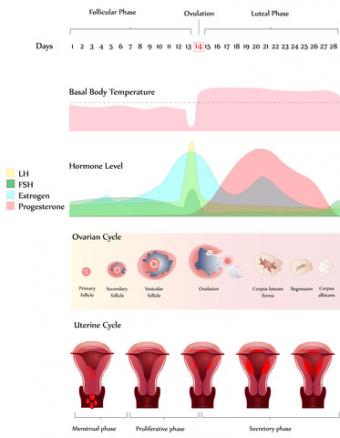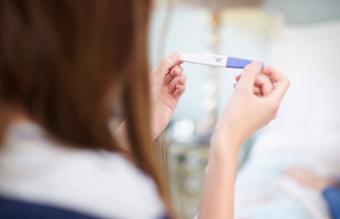
Shorter periods don't affect fertility directly. However, they might be a sign of reduced fertility since they can indicate changes in the reproductive hormones that control your menstrual cycle and bleeding, and this can affect your ability to become pregnant.
What Shorter Periods Mean for Fertility
If your periods are short or getting shorter, they may or may not indicate reduced fertility. Short periods are not unusual. According to the Office on Women's Health, the average period lasts three to five days, but periods which last two to seven days are still considered normal.
Studies On Short Cycles and Fertility

Three studies looked at the association between short periods and fertility.
- A United States study of menstrual cycle characteristics and fertility, reported in Epidemiology in 2006, found short menstrual cycles and periods of four days or less were associated with decreased fertility and increased miscarriage rates.
- A Bolivian study, published in Contraception in 2001, also found that fertility rates were lower in women with shorter periods.
- The most recent study is a Danish investigation published in the American Journal of Epidemiology in 2011. This study did not find evidence of reduced fertility with short periods, but it did find reduced fertility rates in women with menstrual cycles shorter than 25 days.
Hormone Dysfunctions, Short Periods and Your Fertility
The reproductive hormones from your hypothalamus, pituitary and ovaries control your menstrual cycles and the development of your endometrium as well as the length of your periods and your fertility. Dysfunctions in these hormones can lead to:
- Abnormal menstrual cycles (long, short or irregular)
- Poor growth of your endometrium
- Shorter or longer, lighter or heavier periods
- Difficulty conceiving
Effect on Ability to Conceive
Hormone disturbances can cause abnormal growth and maturation of the follicles and eggs and affect ovulation. In turn, this can affect your ability to become pregnant if:
- An egg doesn't develop.
- Ovulation fails to occur, so there is no egg to fertilize.
- An immature or defective egg ovulates, but it fails to fertilize.
- There's decreased production of estrogen and/or progesterone.
Sometimes dysfunctions within the ovarian cycle cause these failures, despite normal levels of hormones from the hypothalamus and pituitary.
Effect on Endometrium and Length of Periods
Estrogen and progesterone grow and mature your endometrium for a pregnancy or a normal period. With insufficient production of one or both of these hormones, the endometrium remains thin because of poor development. This can lead to:
- Shorter or lighter periods because there is less lining to shed
- An embryo's failure to implant or grow in the unprepared lining
Abnormal implantation or growth of the embryo can result in a chemical pregnancy or a miscarriage.
Problems Affecting Hormones, Menstruation and Fertility
Hormone disorders can cause abnormal egg production and ovulation, shorter periods, and decreased fertility. Some of the most common disorders include:
- Hyperprolactinemia: Increased prolactin from the pituitary can cause irregular cycles, lack of periods, and short periods.
- Thyroid disorders: High or low thyroid hormones can affect the menstrual cycle, ovulation, and your periods.
- Premature ovarian failure or ovarian insufficiency: This is premature aging of the ovaries in women under 40 years, and it causes premature reduction of the ovarian follicles and eggs.
- Polycystic ovarian syndrome: This condition interferes with ovulation and causes irregular periods and various types of bleeding.
Abnormal Endometrium and Short Periods

You can have short, light, or no periods because your endometrium is abnormal and unable to respond to normal levels of estrogen and progesterone. Causes of abnormal endometrium, which can lead to scarring or thinning of the endometrium, include:
- A history of uterine infection
- Dilatation and curettage (D&C) for an abortion, miscarriage, or a diagnosis
- Endometrial ablation to treat abnormal uterine bleeding or heavy periods
- Previous surgery to remove abnormalities in the uterine cavity, such as polyps and fibroids
These causes of short periods can interfere with implantation if you get pregnant and increase the risk for miscarriages.
Track Your Cycles

It's not unusual to have short periods or occasional periods which are shorter than normal. They may or may not indicate hormone abnormalities or disorders that can affect your fertility. If you're concerned about the length of your periods or notice a change from your usual pattern of bleeding, keep a record for at least three cycles. Include the timing of intercourse if you are trying to get pregnant.
When to See a Doctor
See your doctor if your periods are persistently short or light, especially if they last less than four days, or your cycles are shorter than 25 days for three or more cycles in a row. Your gynecologist can tell if you're fertile by compiling a complete history, giving you a physical exam, and conducting hormone tests. Your doctor may also refer you to an infertility specialist to further explore any reproductive issues you might have.







